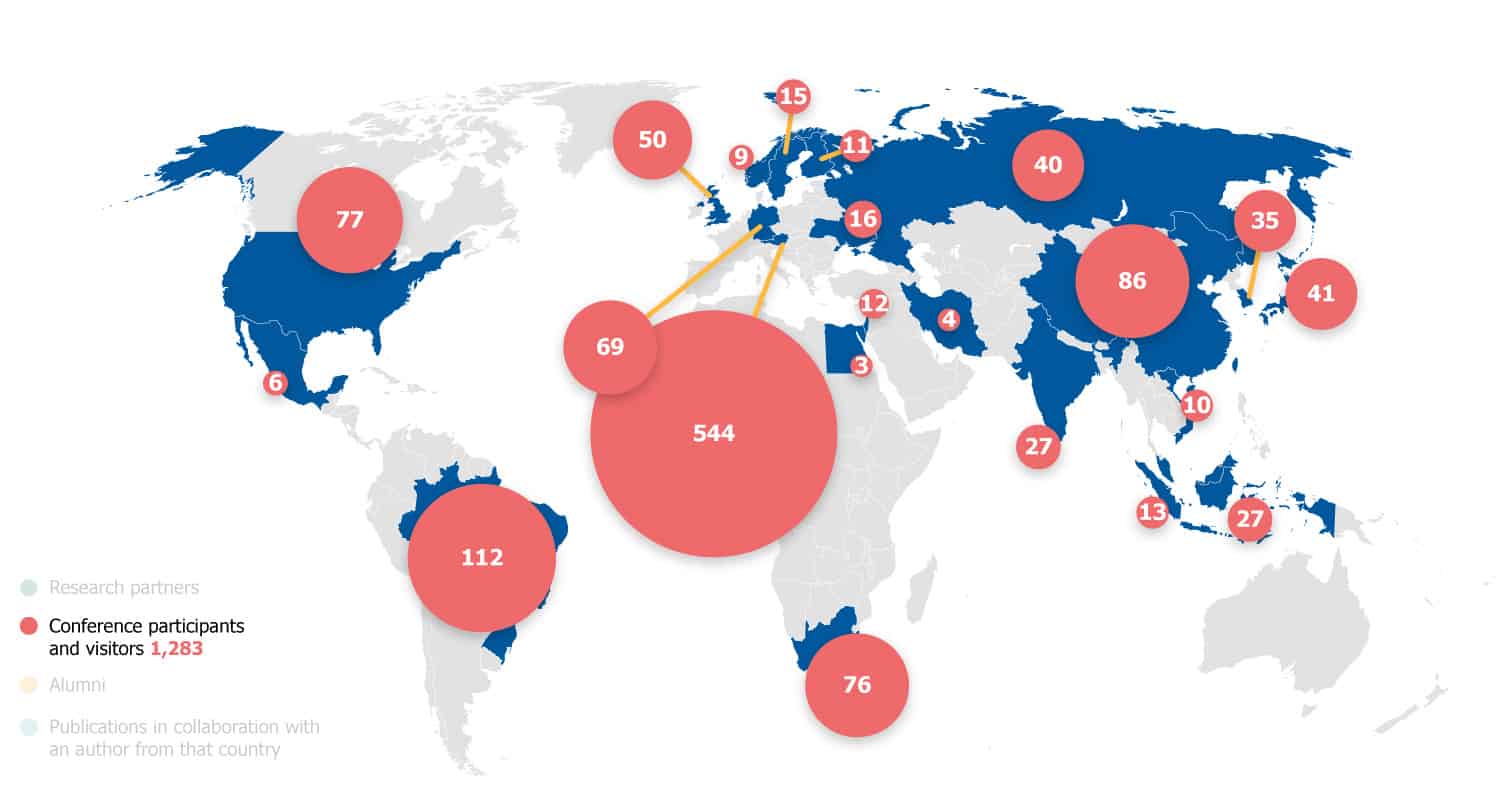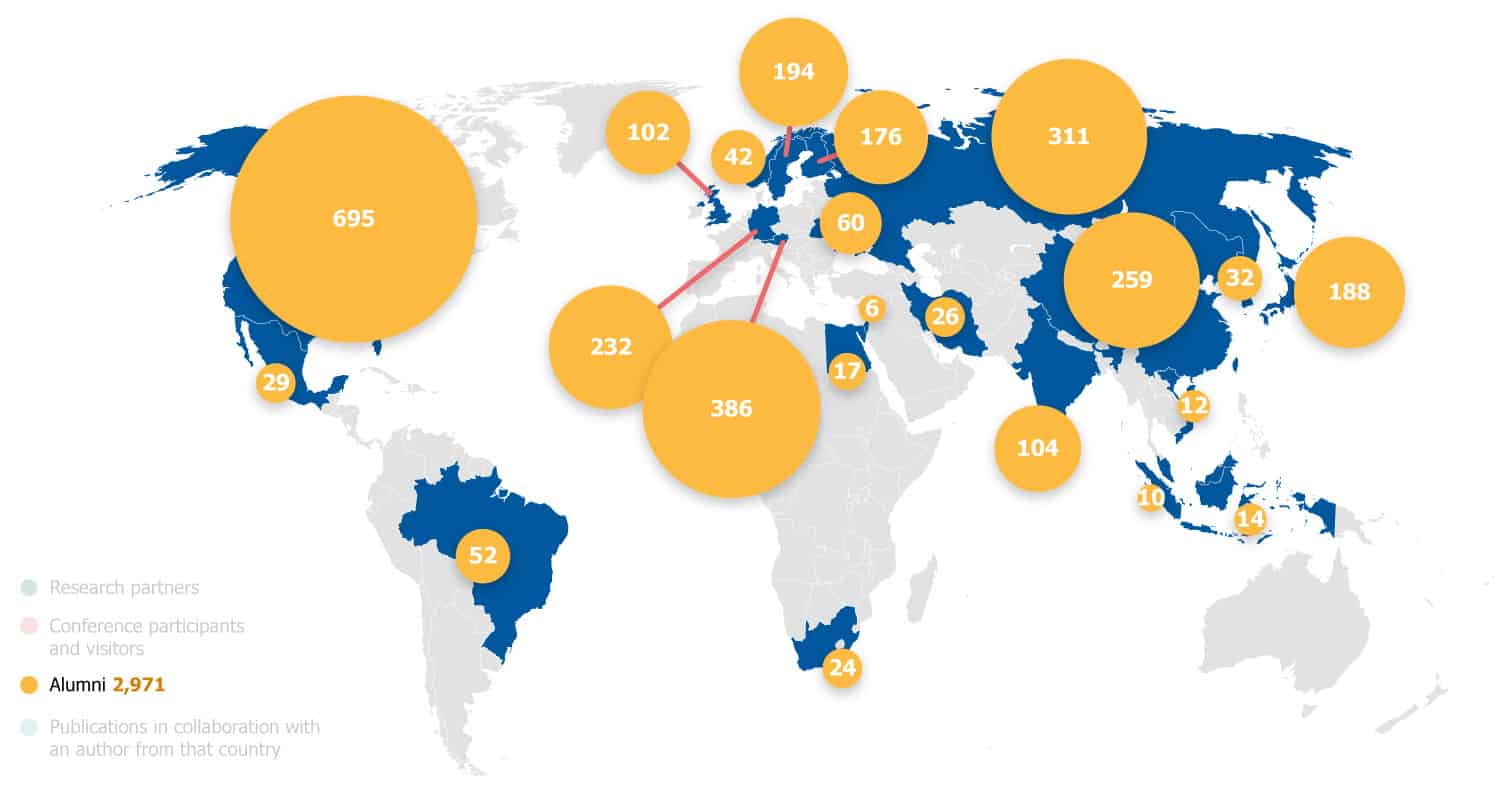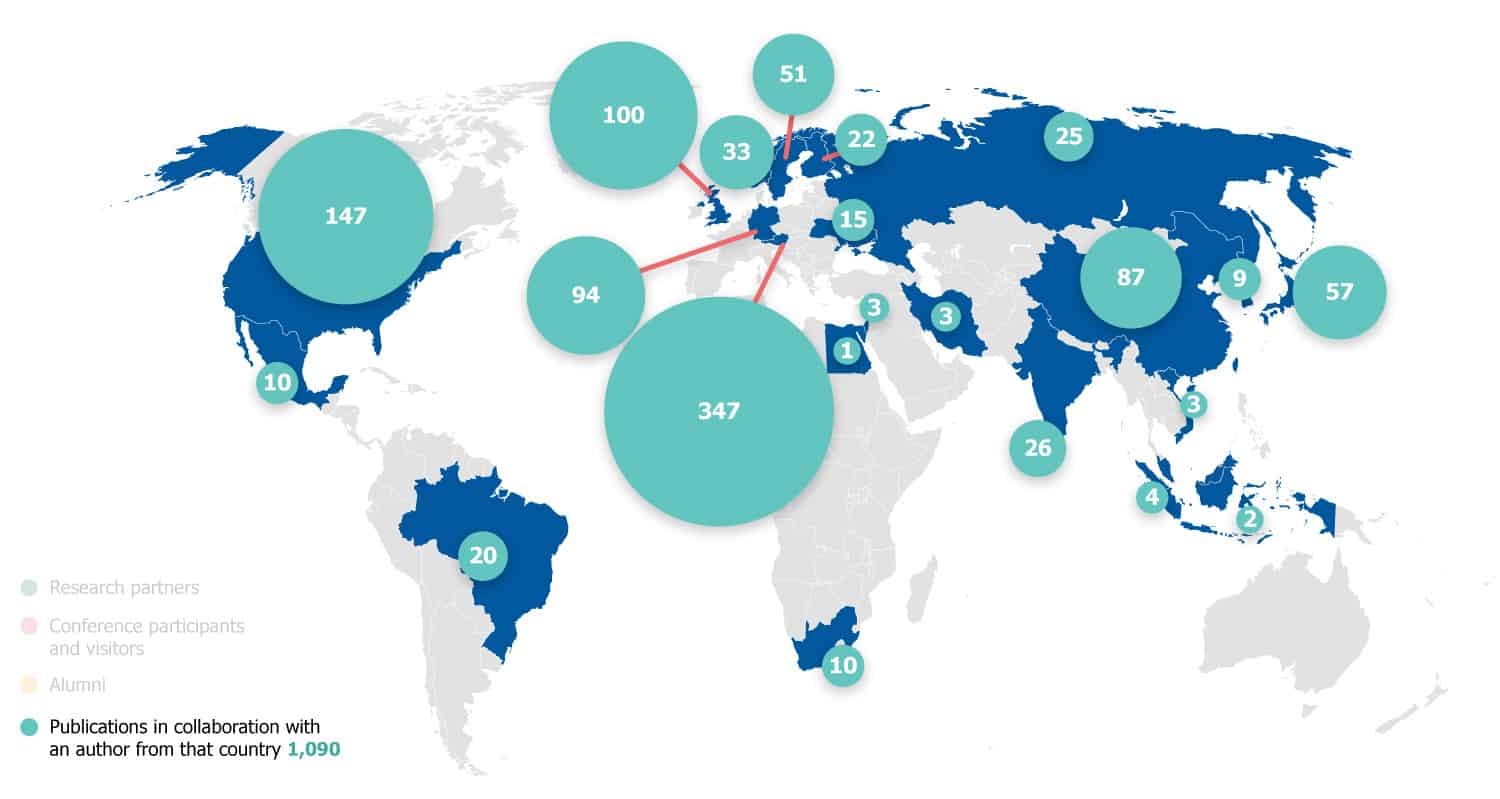Network and collaborators
In addition to the 417 researchers from 52 countries that work in Laxenburg, IIASA has an extensive network of collaborators, alumni, and visitors from across the globe.
number of advisory boards and steering committees that include IIASA researchers
externally funded projects where IIASA was lead or partner
research partners in member countries
alumni from 100 countries
- 1,589 visitors came to IIASA to do research, collaborate with the institute’s research programs, and attend IIASA events. Of these visitors, 1,283 were from member countries.
- IIASA scientists hosted or coordinated 89 events worldwide. Of these, 49 were convened in Laxenburg and 25 were held in member countries. The events were attended by a total of 1,195 conference participants, with 967 being from member countries.
Science diplomacy
In 2019, the Big Research Infrastructures for Diplomacy and Global Engagement through Science (BRIDGES) network was founded as an informal network of people who work at the coalface of science diplomacy and foreign relations in large international research infrastructures and organizations. The inaugural meeting of the network took place in July 2019 at the Abdus Salam International Centre for Theoretical Physics (ICTP), Italy. This was followed by a meeting hosted by IIASA in November.
The network, which was an initiative of IIASA and the European Organization for Nuclear Research (CERN), includes representatives from organizations such as the European Commission Joint Research Centre (JRC), the European Space Agency (ESA), Synchrotron-light for Experimental Science and Applications in the Middle East (SESAME), and IIASA, who also acts as the secretariat.
In November 2019, IIASA co-hosted meetings of the Foreign Ministries Science and Technology Advisors Network (FMSTAN) and the Science Policy in Diplomacy and External Relations (SPIDER) network. This forum brought together over 60 science advisors to ministers of foreign affairs, experts in science diplomacy, and heads of a number of Vienna-based international organizations. The event helped develop the discussion around the roles, advantages, and opportunities of using the tools of science diplomacy in foreign relations.
- IIASA has 4,267 alumni from 100 countries, many of whom are leaders in academia, government, and the private sector. The Alumni Association coordinates exchange within this network.
- Former Science Advisory Committee member Eric Lambin received the Blue Planet Prize.
- Yoichi Kaya, Eric Lambin, and Leena Srivastava became IIASA Distinguished Visiting Fellows.
Regional conferences
In 2018, the IIASA Council passed a resolution to co-host a series of regional conferences to foster dialogue between research and policy communities, with the aim to explore the role of systems analysis in addressing regional and societal challenges and to provide input into the strategic direction of IIASA.
The first two conferences were held in Brazil in September and South Africa in December 2019. The conferences attracted a total of 250 participants from 31 different countries and covered various topics ranging from the transition towards sustainable land use, to how global research networks can increase research collaborations among countries.
The conferences also included interactive sessions, where inputs were gathered from the audience on how the future IIASA strategy can focus its research on major societal issues, identify science-based policy solutions, respond to the interest of broader IIASA membership, and compete and collaborate with other research organizations studying global problems.
Strategic partnerships and collaborations
In 2019, IIASA continued to prioritize partnerships with research collaborators and research users in its 22 member countries. These partnerships include formal collaborations between institutions as co-investigators on externally funded research projects, and informal cooperation between individual researchers working together on scientific publications.
The focus of IIASA research on finding solutions to challenges that cross international boundaries results in strategic collaboration with a range of international and regional organizations. In 2019, these included:
- A strategic partnership with the Organisation for Economic Co-operation and Development (OECD) to develop methods and approaches to better integrate systems thinking into policymaking.
- Hosting the Centre for Integrated Assessment Modelling (CIAM), one of the four centers that make up the European Monitoring and Evaluation Programme (EMEP) of the United Nations Economic Commission for Europe (UNECE) Convention on Long-range Transboundary Air Pollution.
- Contributions by 11 IIASA researchers to the Intergovernmental Panel on Climate Change (IPCC) Sixth Assessment Report, which will be published in 2021.
In addition, IIASA signed Memoranda of Understanding with 23 organizations to facilitate research collaborations and the use of IIASA research by institutions in countries such as Austria, Brazil, China, Finland, Russia, the UK, the US, and Vietnam. Also in 2019, IIASA was granted consultative status to the United Nations Environment Program (UNEP).
The CD-LINKS project coordinated by IIASA and 18 partners and collaborators from around the world, including the IIASA member countries Brazil, China, India, Japan, Korea, Russia, USA, and several EU countries, ended after four years in September 2019. Project highlights included insights generated on interactions between climate change policy and multiple sustainable development goals, broadening the evidence base on the effectiveness of past and current policies, and developing the next generation of low-carbon development pathways, fostering both global and national perspectives.
IIASA is a core member of the Food and Land Use (FOLU) Coalition that brings together stakeholders from academia and the public and private sectors to identify and advance solutions that deliver food security, healthy and affordable diets, halt biodiversity loss, restore and protect ecosystem services, and mitigate climate change and environmental pollution. In its 2019 flagship report, FOLU identified ten critical transitions to shift food and land use systems onto a sustainable trajectory, highlighting the importance of an integrated approach to solution pathways that satisfy multiple social, economic, and environmental objectives.
Together with the Sustainable Development Solutions Network (SDSN), IIASA initiated the Food Agriculture Land Use Biodiversity and Energy (FABLE) Consortium as a knowledge platform. FABLE brings together research and policy teams from 20 developed and developing countries to advance analytical tools and model-aided decision support to analyze the ability of development pathways to meet national aspirations, while also collectively aligning with, among others, the Sustainable Development Goals (SDGs) and the Paris Agreement.




